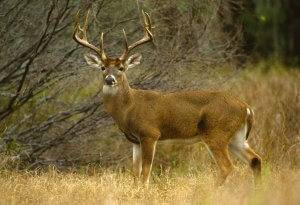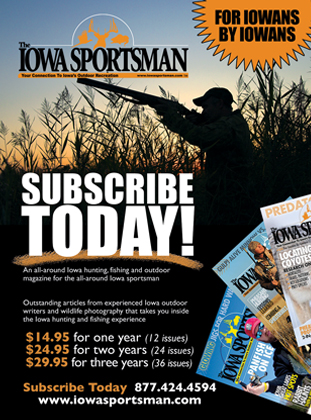Deer Hunting 101 – Mentored Deer Hunts
Deer Hunting 101 – Mentored Deer Hunts
By Ben Leal
Alarm clock rings in the background…its 4AM on a Saturday and 10 hunters from Central Iowa are getting up and preparing for their very first attempt at harvesting a deer. Camouflage clothing…check…hunting license…check…extra cloths for warmth…check…okay, time to head on out for a 6AM breakfast and hunting area assignment. This is a mentored deer hunt out at Lake Ahquabi, hosted by the Warren County Conservation Board and sponsored by Ahquabi Chapter of Whitetails Unlimited. This mentored hunt is one of many that take place across the State covering a wide range of hunting activities such as ducks, geese, pheasant and turkey.
“The first Warren County Mentor Hunt was held November 13-15, 2009”, said Warren County Naturalist Logan Roberts. “That year we had 6 participants in the program.” Each mentor hunt is preceded by an informational day where The Iowa Department of Natural Resources provides education in deer biology and history as well as laws pertaining to hunting here in Iowa. Part of the introductory day is a field portion. There are three stations set up for the afternoon; tree stand safety, tracking, and the shotgun range. “We’ve had several different formats for having the information day followed by the days we hunt”, continued Roberts. “The first year the information portion of the weekend took place Friday evening and Saturday morning. We then hunted Saturday afternoon and then all day on Sunday.” In the following years they had the informational portion of the program broken down into three small sessions followed by hunting on Saturday and Sunday.
In 2013 and 2014 the informational day was all day Saturday the weekend before and then hunting all day Saturday and Sunday the following week. “By changing these dates and trying out different formats, we think we’ve made it easier for participants to commit to the program,” added Roberts. “This also optimizes the amount of time we get in the field.”
Education
Jim Coffey with the IDNR Wildlife Research Staff began the morning session with a lesson in deer biology and a bit of history. “Have deer always been present in Iowa?” asked Coffey. Smiling at the group he tells everyone that deer were present in Iowa in 1846 when the State was settled. “Deer however were exterminated in the following years due to year round hunting”, he added. “There were no laws governing the deer harvest or when an individual could hunt at that time”. Early in the 1950’s deer started coming back to the State, some were introduced, mostly in Southwest Iowa. The estimated population at that time was about 4,000 deer.
The first deer season in Iowa took place in the mid-1950’s to control deer populations due to fears and concerns over deer causing crop damage. The hunt was scheduled for late December and was the first time that laws and harvest limits were implemented. These deer hunting seasons were scheduled for late December primarily to accommodate the farmers that wanted to hunt deer at that time and due to the lengthy time it took to bring in the harvest. 
“So why do we have these managed hunts in State parks and areas where we normally are not allowed to hunt?” asked Coffey. “Deer are very social animals; they tend to stay in the same area for an extended period of time. These deer populations can get out of control in wildlife preserves and cause issues with vegetation and localized farming.” Coffey called this the “rose pedal” affect. A doe will have a fawn or two in one area and then her offspring will do the same within that same geographical area and it just keeps growing. “I put a radio collar on a fawn out at Waterworks Park and 12 years later I found the doe dead, 200 yards from where I originally put the collar on her”, he explained. “Though she probably roamed more than 200 yards in that time frame, it was perfect example of how these deer tend to stay in the same area throughout their lives.”
Coffey also educated these first time hunters on deer biology in the class room but then also followed that up with a firsthand look at field dressing a deer. Participants made their way down to the back of the facility where a doe that had been harvested earlier that morning was waiting. Coffey explained to everyone the do’s and don’ts of field dressing as well as some very important safety tips. “Never pull the knife towards you”, he said, “and be careful not to pierce the stomach or intestines; this will contaminate some of your meat.” As he made his cut the group was met by some really fowl air as it escaped the doe. There’s nothing like a lesson in the field where you not only see, but smell deer. “An animal will begin to decompose as soon as it dies”, grimaced Coffey, “these gasses build up inside the animal, hence the nice smell we are all getting to experience this morning”. Once the doe was completely dressed he pointed to various organs and identified them for the group.
Lunch is provided for all participates of the program and timing is really everything. What followed the field dressing exercise was pizza, drinks and dessert. I’m sure the smell of fresh pizza helped everyone forget the odiferous doe out back.
IDNR Conservation Officer Craig Cutts was the next presenter on the schedule and he talked about laws governing hunting in the State of Iowa as well as ethics. “Ethics are moral principles that govern a person’s or group’s behavior,” said Cutts, “as C.S. Lewis said, “It’s doing the right thing, even when no one is watching”. He wanted to instill in these new hunters that it’s not only about the hunt, but it also about the overall experience. “I remember sitting in a tree stand one afternoon and a finch landed on my arrow as I sat,” reflected Cutts. “It looked around and then just flew off. It’s those types of experiences that make going out all worthwhile.”
The conservation officer took time to go through the IDNR Hunting Prospectus and pointing some of the laws and regulations pertaining to deer hunting. He covered everything from legal harvesting of an animal, tagging requirements and how to report your harvest. As he concluded with his portion of the day he reminded hunters that it’s not just about shooting a deer. “There are a lot of deer in the park”, continued the officer. “However not everyone here will be successful. Remember that the hunt is like mashed potatoes and the opportunity to harvest a deer is like adding gravy.”
Time to Hunt
A week later, Saturday morning at 6AM…“Okay, you two head down to the South end of the lake and take a seat in blind number 3”, said Lake Ahquabi Park Manager Josh Shipman. “We’ve seen a doe and two fawns in that area in the last week bumped them when we set up the blind a few days ago.” And with that my son and I had our hunting area assignment. One by one, 9 additional hunters and their mentors received blind assignments and within minutes everyone was off to get set up before sunrise.
As dawn approached the woods started waking up. Geese were flying overhead heading toward the lake for the morning, birds of all kinds were waking up with a song and squirrels were busy looking for a winter’s stock of acorns. Each mentor and hunter sat quietly anticipating what was to come. Early in the day, my son and I had a small buck walk in to our right. “Hey buddy”, I whispered. “Turn your head really slow and take a look. There’s a small buck walking right by us.” We sat quietly as the buck walked on by and made his way to the tree line in front of us. “That was cool Dad!”
I had the privilege of mentoring my son on his first hunt. There were several other parent mentors this year as well as other volunteer mentors that simply wanted to give back to the traditions that they love. Later that first morning a shot rang out in the park, one of this year’s first time hunters Dominique Selgrade mentored by his father-in-law Steve Osbourne, just shot his first deer. That was the only successful harvest for the Saturday morning hunt.
“One big change that we made this year was that we used the Annett Nature Center as our base camp”, said Roberts. “It made it a lot more comfortable and convenient for both the participants and the mentors.” Breakfast and lunch were both served at the center and participants were able to relax, get to know one another and share some of the morning experiences. As the afternoon wore on it was time to gather up gear and head back out for yet another sit in the blinds.
This year there we two additional hunters that were successful in harvesting their first deer over the weekend, Jeff O’Brien mentored by WCCB season staff member Kevin Brown, and Bailey Kaas mentored by her dad Todd Kaas.
Great Program
“I think it’s amazing that even if a participant doesn’t harvest a deer they can learn so much in just two weekends”, noted Roberts. “They can see natural things they’ve never seen before, observe animals they’ve never encountered before and experience shooting for the first time.”
There are only a couple requirements to participate, one is that the hunter is a novice, and they have completed the hunter’s safety course. “We advertise it all around our local communities and Des Moines, “added the naturalist. “It’s great to have kids participate, but we also have men and women who have a chance at shooting their first deer.” Those that have participated in the past are put on a waiting list to allow first timers a chance in the program.
The Warren County Conservation Board mentored hunt would not be possible without the great support from sponsors, volunteers and partners. Jim Coffey, IDNR Wildlife research staff technician covers deer biology, anatomy, deer management and field dressing. Craig Cutts Conservation Officer with the IDNR reviews hunting laws and the role of the conservation officer. Allen Crouse IDNR Recreational Safety Officer covers tree stand safety and Josh Shipman Lake Ahquabi Park Manager sets up all the ground blinds and covers unit assignments for hunters. The IDNR shooting sports and Whitetails Unlimited sponsored backpacks containing an assortment of goodies for each participant.
“We are always looking for more volunteer mentors to keep the program going”, said Roberts. “Anyone interested in mentoring can contact me to be added to the contact list for next year’s hunt.” Mentors have the opportunity to spend a weekend in the woods, share experience and knowledge with someone that will remember the hunt for the rest of their lives.
The future of this great sport that we so enjoy lies in the hands of those that we mentor and bring up to respect and take care of the resources we have in this great State. Whether you mentor your own son or daughter, or take time to share your knowledge with a novice hunter, young or old, rewards will last a lifetime. Take time to consider volunteering…its well worth it.
For information on other mentored hunting programs within the State visit the IDNR website at “http://www.iowadnr.gov/Education/CampsWorkshops/MentoredOutdoorExperience.aspx
For more information on the Warren County Conservation Board mentored hunt or to contact Logan Roberts, visit their website at “http://www.warrenccb.org/ Good Hunting!

